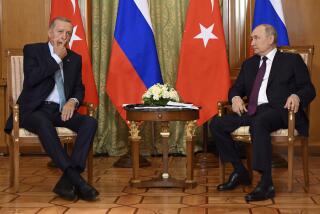Global wheat production expected to drop 4%
Wheat rose to a 23-month high in Chicago as Russia, the world’s third-biggest grower, banned exports because of the country’s worst drought in at least a half-century.
Halting shipments would be “appropriate” to contain domestic prices that jumped 19 percent last week, faster than at the peak of the global food crisis in 2008, Russian Prime Minister Vladimir Putin said in Moscow. A government decree signed today bans exports of wheat, barley, rye, corn and flour from Aug. 15 to Dec. 31.
“As of today, Russia has no grain market,” said Kirill Podolsky, the chief executive officer of Valars Group, the country’s third-biggest grain trader. Valars will stop exports immediately because shipments may be held at customs until the start of the ban, he said. “This will be a catastrophe for farmers and exporters alike.”
A heat wave in Russia, dry weather in Kazakhstan, Ukraine and the European Union, and flooding in Canada has ruined crops and fueled a surge in Chicago wheat prices of as much as 92 percent since June 9. Russia’s drought is now threatening sowing plans for winter grain and damaging such crops as sugar beets, potatoes and corn, the national weather center said this week.
Wheat for December delivery rose 59.75 cents, or 7.9 percent, to close at $8.1525 a bushel at 1:15 p.m. on the Chicago Board of Trade. Earlier, the price advanced by the CBOT’s 60-cent limit to $8.155, the highest level since August 2008.
Wheat reached a record $13.495 in February 2008, part of a surge in prices that sparked food riots from Haiti to Egypt.
Cargill Questions Ban
Milling-wheat futures for November delivery surged 6.9 percent to 223.50 euros a metric ton, or about $8.02 a bushel, on the NYSE Liffe exchange in Paris.
Cargill Inc., the largest U.S. agricultural company, said implementing trade barriers in response to higher wheat prices and lower yields exacerbates supply problems.
“The U.S. wheat crop has been strong and world wheat stocks are higher than they were during the wheat-price spikes in 2008,” Mark Klein, a spokesman for the Minnetonka, Minnesota-based company, said today in an e-mailed statement. “Such trade barriers further distort wheat markets by making it harder for supplies to move from areas of surplus to areas of deficit.”
Putin told a government meeting in Moscow that Russia has “sufficient reserves” of grain, “but we must prevent domestic prices from rising, preserve cattle herds and build up reserves.” Putin also proposed that Kazakhstan and Belarus suspend exports, according to a statement.
Force Majeure’
Russia was urged to impose a ban by traders including International Grain Co., the Russian unit of Glencore International AG. A ban would allow traders to declare force majeure on contracts, International Grain Deputy Chief Executive Officer Nikolai Demyanov said by e-mail Aug. 3. Force majeure is a legal clause that allows a company to cancel contracts because of circumstances beyond its control.
Russian companies may cancel shipments of about 600,000 metric tons of wheat to Egypt because of the ban, Valars’ Podolsky said. Egypt is the world’s biggest wheat importer and expected to buy 9.3 million tons in the 12 months ending in June next year, the U.S. Department of Agriculture forecasts. Russia was forecast by the USDA to export 15 million tons in the same period, behind the U.S., EU and Canada and tied with Australia.
Demand for supplies from Australia may gain, said Tom Puddy, the wheat-marketing manager for Perth-based CBH Group’s export division. “A lot of the users are sort of in shock,” he said.
2008 Record Highs
Food costs advanced to records in 2008 as some exporters curbed shipments amid a shortage. While the United Nations’ food-price index is 22 percent lower than its peak in June 2008, the gauge is 13 percent higher than a year ago.
Concern that lower-than-expected wheat output may contribute to a food crisis is “unwarranted at this stage,” the UN’s Food and Agriculture Organization said yesterday.
Surging wheat costs may increase food inflation as they filter through to consumers, challenging central bankers to restrain price growth as they attempt to sustain the global economic recovery.
Higher prices may complicate “policy making for central banks since there is little they can do on the monetary-policy side as it won’t affect the price of commodities,” said David Cohen, an economist at Action Economics in Singapore. “They don’t want to get behind the inflation curve, but at the same time, they won’t get overly concerned because of weather-related swings in food prices.”
World wheat stockpiles may decline 2.5 percent to 192 million tons by June as dry weather hurts the outlook for crops in Russia, Kazakhstan, Ukraine and the EU, the International Grains Council said on July 29, reversing a forecast for higher inventories.
More to Read
Sign up for Essential California
The most important California stories and recommendations in your inbox every morning.
You may occasionally receive promotional content from the Los Angeles Times.










